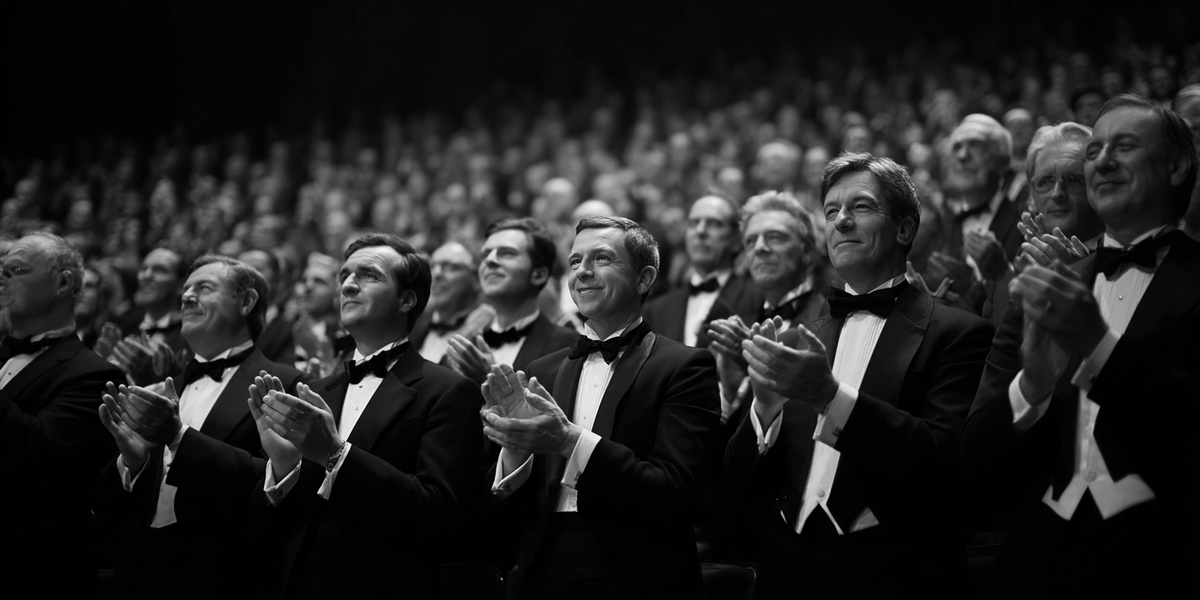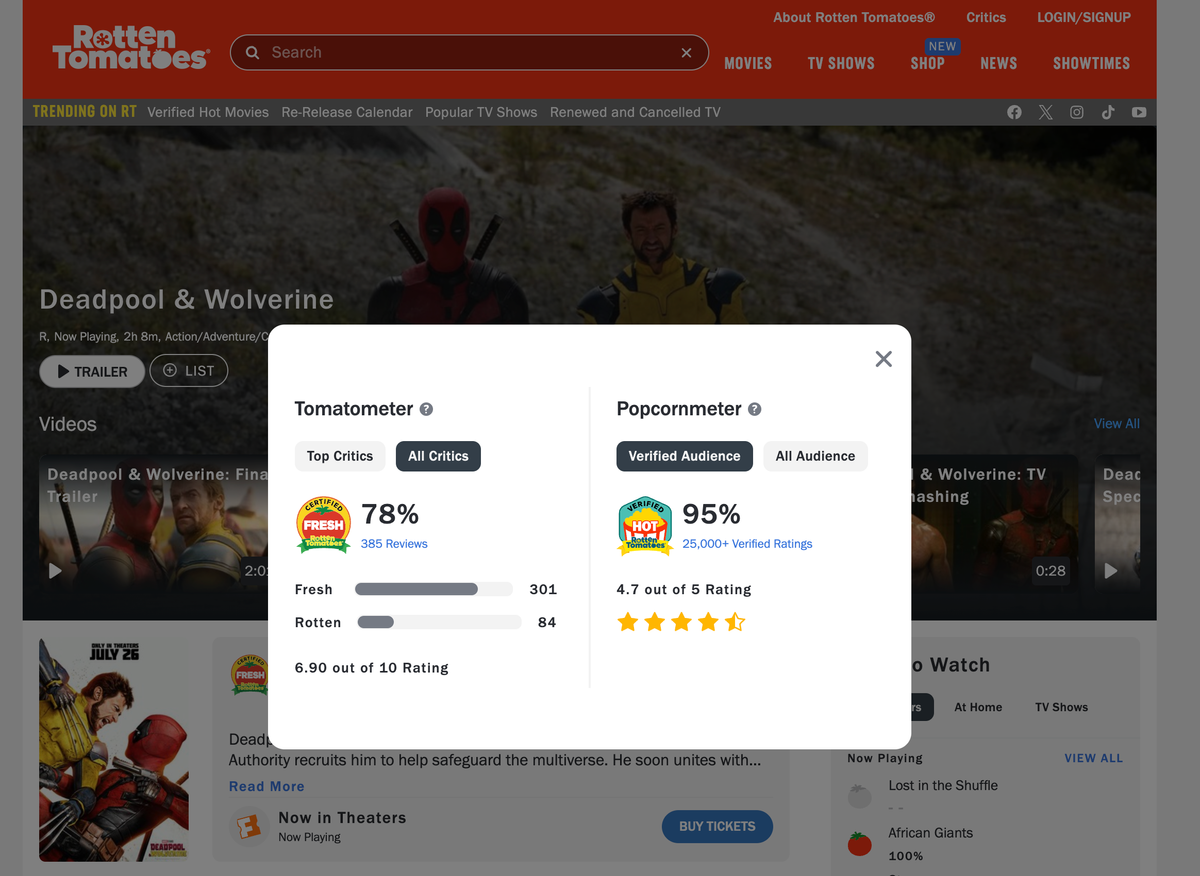Something Rotten in the State of Tomatoes

Around these parts, I like to make fun of film festival applause inflation. It's a game being played in the press trying to make the public believe that the length of a standing ovation at one of these events has any correlation to how good a movie actually is (spoiler alert: it does not). There are interesting social dynamics at play in the actual ovation, but the lengths reported are clearly bullshit as they keep jumping around in headlines. And that's all about ego. Undoubtedly PR people trying to ensure that the movie they represented matches or surpasses the other movies it's up against. It's silly and it's nonsense. But there's a much bigger game afoot.
Matt Belloni took one look at the Rotten Tomatoes scores being touted for movies coming out of the film festivals and called BS:
But it’s all kinda become B.S. noise, a victim of the overall praise inflation that has terminally afflicted late-stage Hollywood. Nobody believes the festival hype anymore because it’s all become just hype, and everyone seems to be in on the grift—from the media outlets seeking clicks to the journalists coveting access to the review aggregators chasing engagement. At the center of it all is Rotten Tomatoes, which is simultaneously the most influential arbiter of quality in the movie business and a misleading mess. How did that happen?
A decade ago, I first wrote about my love of Metacritic in the face of the rise of Rotten Tomatoes. Why? Because give me the "wisdom of the well-informed" over the "wisdom of the masses" any day. The masses, as they say, are asses. And part of that jackassery is the fact that they can be gamed. Or worse, bought and sold.
But even just more tactically, I had spent years looking at the discrepancies in scores between the two sites and always finding myself siding with Metacritic. Rotten Tomatoes was clearly inflating ratings (by including jokers in their review pools) even back then.
At this point, most savvy moviegoers kinda know Rotten Tomatoes has been diluted and corrupted to the verge of incoherence. Owned since 2016 by Universal and Warner Bros., the site and its binary grading system—reviews are categorized as either a tomato or a splatter, with no room for nuance—have always infuriated filmmakers and disserved users. But lately, studios have become even more aggressive in gaming the scores, both by strategically embargoing reactions and formal reviews, and doing their best to empower the writers whose opinions tend to serve their interests. (It’s always hilarious to see the effusive praise of a mediocre movie from people invited to a splashy premiere dutifully aggregated by the media, followed the next day by a steaming crap sandwich from actual critics whom the studio doesn’t control—often at those same media outlets.)
That also reminds me of the situation where you see the "initial reactions" to a movie premiere on social media that declare, say, Mission:Impossible 8, to be the greatest action movie of all time. It was fine! But it was clearly not that. Obviously – obviously – the people invited to such events are either suffering from the worst case of recency bias imaginable, some very real acute forms of starfuckery, or just want to be invited to the next premiere. Or all three. Often all three.
It helps that the “Certified Fresh” rating is often generated by only a handful of reviews at echo chambers of enthusiasm like Sundance or Venice. Social media aggregator accounts with large followings then pick up the early high scores as gospel, creating a false narrative of extreme quality. Recently, The Smashing Machinewent viral with a “debut” score of 100 percent Fresh out of Venice, but it was quickly knocked down to 84 percent and falling, even before most of the mainstream critics have had a crack at it. That’s a strategy, not an accident.
You see so much marketing these days about the "100% Fresh" rating, which is literally just off of a handful of these friendly reviews. The marketing, of course, is never updated. And it doesn't matter because movie openings matter more than ever.
Perhaps most egregious, the site now aggregates the actual critics alongside dozens of random awards pundits, fan accounts, and Substackers with opaque credentials or agendas, minimizing the influence of career writers who bring experience, transparency, and oversight from editors. Some argue this is an overdue democratization of the critical elites, who until recently were largely white and male and dismissive of the kind of popcorn fare that average audiences prefer. I get that. The reality is that the professional critic is a dying breed—many once-influential outlets, like The Chicago Tribune and Vanity Fair, recently eliminated their critic positions precisely because opinion has become ubiquitous online. But the result is pretty obvious: Rotten Tomatoes has become a steaming tar pit of random takes, agenda-driven awards punditry, and press junket fluff, largely indistinguishable from the social media morass it purports to float above.
Plus, the whole thing is vulnerable to outright fraud. Studios can complain and get ratings switched if a lukewarm review is deemed inappropriately negative. Two years ago, New York reported on the P.R. firms that recruited little-known “critics” and paid them to write or change reviews that boosted RT scores. One film was elevated from Rotten (46 percent) to Fresh (62 percent) after the manipulation. It’s all very gross.
Said another way: the masses are asses.
And yet… Rotten Tomatoes somehow remains the industry standard for judging the quality of movies. It’s kinda nuts. No individual critic matters anymore, only the “Certified Fresh” score, which studios splay across TV and digital ads like a stamp of widespread approval. Kevin Goetz, the test-screening guru, now forecasts RT scores for upcoming movies—which makes sense because they can make or break a release plan. It’s a fake metric of quality that has become a real metric only because Hollywood collectively decided to buy in. Like, say, the Golden Globes.
It's even worse than that when you take into account their new-ish "Popcorn Meter" nonsense, which aims to further "democratize" the whole ratings system – well, as long as you bought your ticket through Comcast-owned Fandagno to be eligible to vote on Comcast-owned Rotten Tomatoes. Corporate democratization! But really, let's be honest, it's about being able to give out more ways for studios to tailor their marketing. Participation badges, essentially.
Belloni goes on to enlist a researcher to see how Rotten Tomatoes scores have trended over the past several years. You'll never guess the results. It's pathetic.
It’s a bummer, but does any of this actually matter? Depends who you are. Hollywood is nothing if not marketing and spin, so the stakes here are admittedly low for people who are savvy enough to see through the B.S. Personally, I go to Metacritic for at least a more accurate assessment of movies, and I’ve vowed to stop citing Rotten Tomatoes. Beyond that, the real issue is that the consumers lose. At a time when everyone is suspicious of the media and Hollywood, the industry’s biggest arbiter of quality is indeed rigged, providing the critical assessment that Hollywood wants rather than the one it needs.
I agree with every single word. I'm not saying fewer and fewer people are going to see movies in movie theaters every year because they feel tricked by this type of marketing – but I'm saying it certainly doesn't help the situation!











